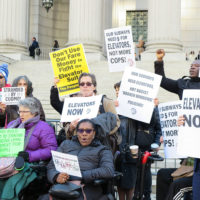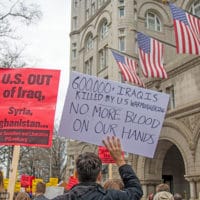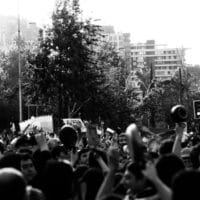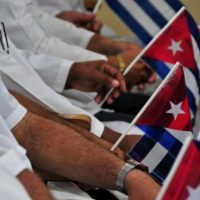-
Why sanctions against Iran and Venezuela during a pandemic are cruel
In the midst of a pandemic, one would expect all countries to collaborate; that a humanitarian crisis of this magnitude would provide ample opportunity to end (or suspend) inhumane economic sanctions. Is this not the time for the imperialist bloc, led by the U.S., to end the sanctions against Cuba, Iran, Venezuela, and a series of other countries?
-
Freedom Rider: Corona Virus and the failed American State
The United States has none of the systems or infrastructure that would allow it to accomplish what China has done to fight mass infection.
-
Big banks call for Wall Street deregulation to “fight Coronavirus”
As Naomi Klein laid out in her bestseller “Shock Doctrine,” the wealthy elite use the confusion caused by economic and other disasters to quickly force through pro-free-market legislation.
-
Elon Musk is acting like a neo-Conquistador for South America’s lithium
Elon Musk, the head of Tesla, wants to build an electric car factory in Brazil. He was supposed to meet Jair Bolsonaro, the president of Brazil, in Miami in early March, but he was too busy; instead, Musk will go to Brazil sometime this year.
-
Looking at change: U.S. and Cuba, blockade and revolution
The U.S. blockade of Cuba is like the sun; neither will disappear soon. But different: the U.S. politicians and people are aware of the sun, but may have forgotten about the Cuba blockade. It’s persisted for almost 60 years, basically unchanged. The following is about change.
-
Yellow-caking an epidemic: New York Times spreads the virus of hatred, again
In a repeat of the gutter journalism used to justify the 2003 Iraq War, the New York Times has had to “yellow-cake” up a foul brew of innuendo, half-truths, misrepresentations, outright lies—spiked fiercely with stereotypes, racial hatred, and red-baiting—to makes its case for a China “cover-up.”
-
The prospect of peace in Afghanistan is real—and Pakistan is the key player
The U.S.-Taliban peace agreement signed in Doha on February 29 must be put in proper perspective. Indeed, there can’t be two opinions that the curtain is coming down on what U.S. President Donald Trump called the “endless war” in which America squandered away over a trillion dollars and lost thousands of lives with no victory in sight. Equally, without a doubt, this is the finest hour of Pakistan’s statecraft since the country’s creation in 1947.
-
A World no longer shaped by Atlantic powers
The annual Munich Security Conference that took place February 14-16 this year turned out to be an iconic event, drawing comparison with the one held in the same Bavarian city on February 10, 2007, where in a prophetic speech Russian President Vladimir Putin had criticized the world order characterized by the United States’ global hegemony and its “almost uncontained hyper use of force—military force—in international relations.”
-
Witnessing the hell that a migrant can face
The Saudi-UAE war on Yemen has been going on for five years. Despite recent peace talks leading to an improvement in aid distribution, the violence has escalated in certain key districts of Yemen over the past two weeks. Since January, 35,000 Yemenis have been displaced from their homes, an indicator of the dangerous situation in the country.
-
Breakthroughs
The right-wing menace, its violence and threat of a genuine fascist take-over, is far from ceasing with the happy ending of a Grimm fairy-tale. Thuringia is where the Nazis gained their first foothold in 1930 and the AfD leader here today, Bjorn Hoecke, is the most vicious and dangerous man in Germany.
-
Elevator Protest: The wheels of justice grind much too slowly for These New Yorkers
Just below the steps leading to the engraved words of George Washington “The true administration of justice is the firmest pillar of good government”, members of the People’s MTA, Rise and Resist’s Elevator Action Group, Disabled In Action, The Peoples Power Assemblies NYC were demonstrating for their right to justice.
-
Bolivia: An election in the midst of an ongoing coup
On May 3, 2020, the Bolivian people will go to the polls once more. They return there because President Evo Morales had been overthrown in a coup in November 2019.
-
U.S. uneasy as Iraq gets new prime minister
The protest movement in Iraq, which is now entering its fourth month, has come to be the principal instrument for Washington to surreptitiously advance the broader geopolitical confrontation with Iran that is being played out within the country.
-
Rebellion in Chile recalls painful history
The U.S. government facilitated the military coup in 1973 and is surely paying attention to Chile now. U.S. officials may be confident in the staying power of current regime but undoubtedly have concerns about the future of investments and trade.
-
Notes on a novel coronavirus
The virus’s final penetrance worldwide will depend on the difference between the rate of infection and the rate of removing infections—by recovery or death. If the infection rate far exceeds removal, then the penetrance may approach the whole of humanity, although there will likely accrue large geographic differences.
-
The Lebanese Intifada, or the growth of an anti-capitalist mass movement
Today the cow is dry. Businessmen stepped on her neck for years, extracting the last drop of milk. There is nothing left for them to fight for, except for the hopes of using us to beg either from the U.S., the E.U. or the Gulf States.
-
Not an inch: Indian students stand against the far-right
With her head bandaged and her arm in a sling, university student Aishe Ghosh went before the cameras to say that the students of the university she attends in New Delhi would move “not an inch back.”
-
Making sense of a shattering defeat
As soon as the scale of Labour’s shattering defeat began to emerge last night, pundits began to push the line that this was not just about Brexit but about Jeremy Corbyn and the shift towards socialism. No election is just about one issue—but the evidence backs up the argument that Brexit was the defining factor.
-
U.S. and allies target Cuba’s overseas medical missions
Three rightwing Latin American governments have forced out Cuban doctors at work in their countries. What they and the US government object to is the revolutionary vision and revolutionary praxis that they represent.
-
‘We want to put a nail in the coffin of this sectarian system’
“Today, the American project is attacking on all axes. We cannot resist it on one axis without the other, i.e. just on the military side. We must resist it at all levels: intellectual, political, economic, and social.”

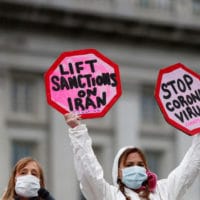



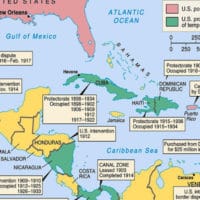

![Secretary of State Michael R. Pompeo participates in a signing ceremony in Doha, Qatar, on February 29, 2020. [State Department photo by Ron Przysucha/ Public Domain]](https://mronline.org/wp-content/uploads/2020/03/peace-signing-200x200.jpg)



